What Kitchen Utensils Do I Need? An Ultimate Guide
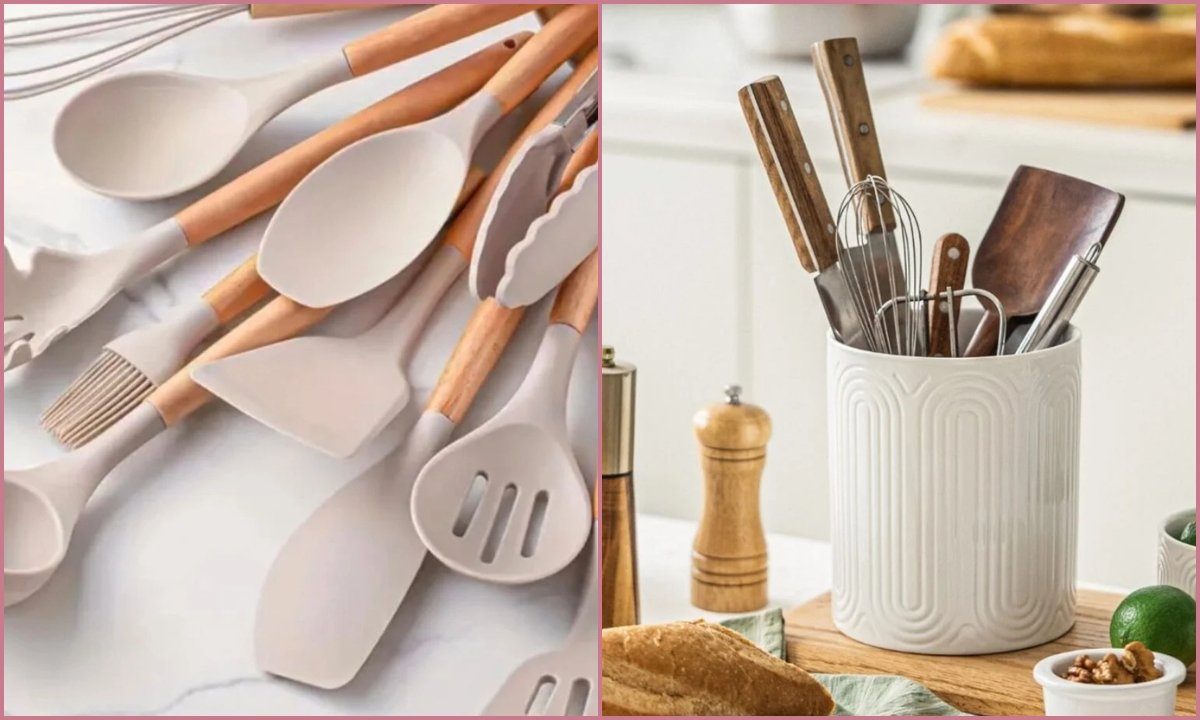
This article may contain affiliate links: read full affiliate disclosure.
Setting up your kitchen can feel exciting at first until you walk into a store or scroll online and realize you’re staring at hundreds of utensils that all tell you they’re “must-haves.”
You start wondering what you actually need and what you’ll just toss in a drawer to collect dust.
You don’t want to waste your money, but you also don’t want that moment when you’re cooking and realize you’re missing the one tool that could have made everything easier.
In this article, you’ll see exactly what you need to start cooking with confidence, what you can skip for now, and how you can build a kitchen that fits your life.
Let’s jump into it!
What Is the Most Important Piece of Kitchen Equipment?
If you ever had to choose one tool that could make or break your cooking, you’d want it to be your chef’s knife.
You will see that a good knife isn’t only about cutting, it’s about how you control it, how fast you move, and how safe you feel.
You will reach for it every single day, whether you’re slicing vegetables, chopping herbs, or trimming meat.
You will notice that when your knife is sharp and well-balanced, you save yourself time and effort, but when it’s dull, you make even simple tasks frustrating and risky.
When you’re just starting out, you should invest in one high-quality 8-inch chef’s knife instead of buying a full set.
If you pair it with a sturdy cutting board, you already give yourself the foundation of every great kitchen.
Few Kitchen Utensils Do I Need
1. Start with the Basics
Every kitchen you create starts with a few essentials that help you cook with ease every day. You can rely on a sharp chef’s knife and a sturdy cutting board to handle almost everything you prep.
You should add a spatula, a ladle, and a pair of tongs so you can flip, stir, and serve without stress.
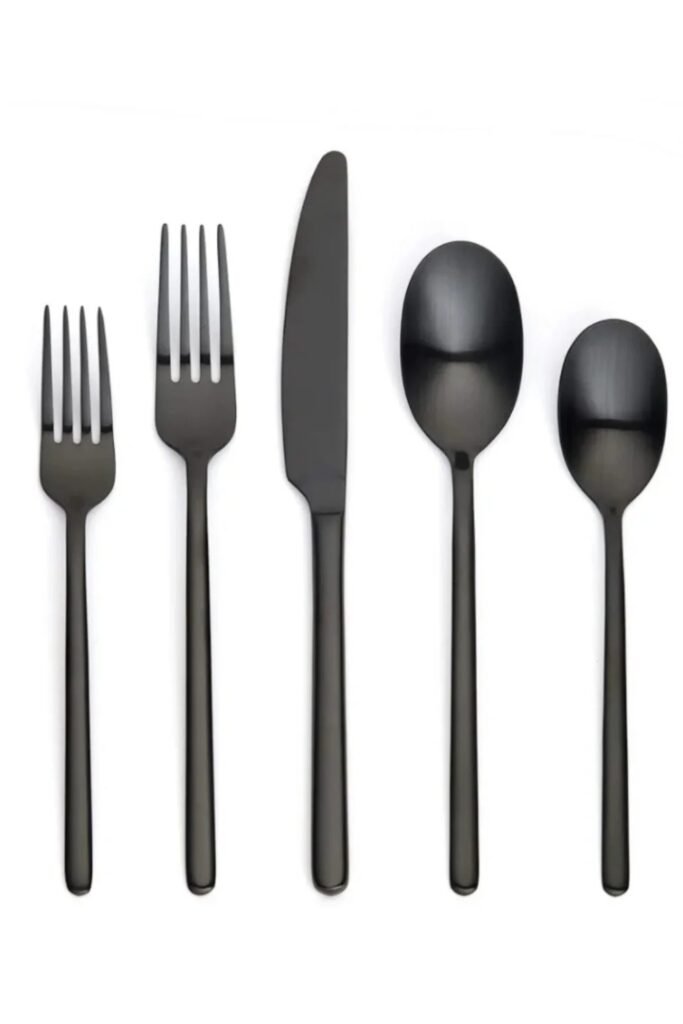
You’ll want a whisk to keep your sauces smooth, and you can use measuring cups and mixing bowls to keep your recipes accurate and tidy.
When you choose tools that feel good in your hand and can handle heat, washing, and daily use, you’ll notice how they quietly become the backbone of your kitchen routine.
2. Level Up Once You Cook More
Once you get comfortable in your kitchen, you’ll see how a few smart additions can make everything smoother.
You can grab a vegetable peeler to save yourself time on prep, and you might use a microplane grater when you want to add a little zest and flavor to your dishes.
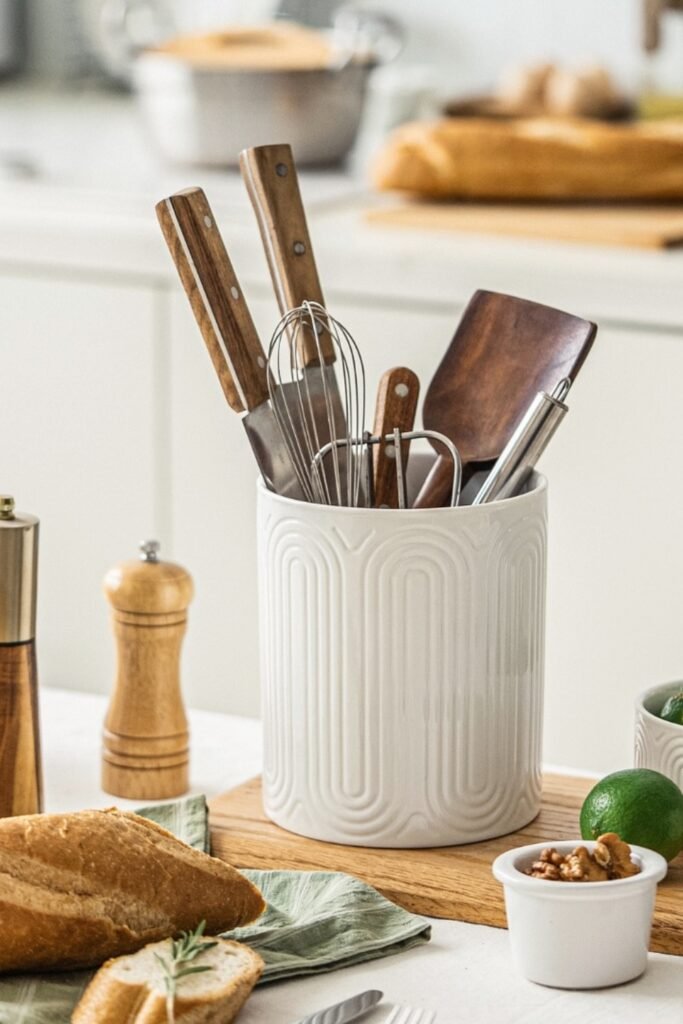
You should keep a kitchen thermometer on hand so you can get your meat and baked goods perfect every single time.
You’ll also love how a pair of kitchen shears helps you trim herbs or open packages in seconds.
These tools aren’t urgent, but once you start using them, you’ll wonder how you ever cooked without them.
3. Match Tools to Your Cooking Style
Your utensil needs will always depend on how you cook and what you love making most.
If you bake often, you should invest in measuring scales, a whisk, and silicone spatulas so you can get better accuracy and smoother results.
If you love quick stir-fries, you can grab a wok spatula and a pair of tongs because you’ll see how easily they handle high heat.
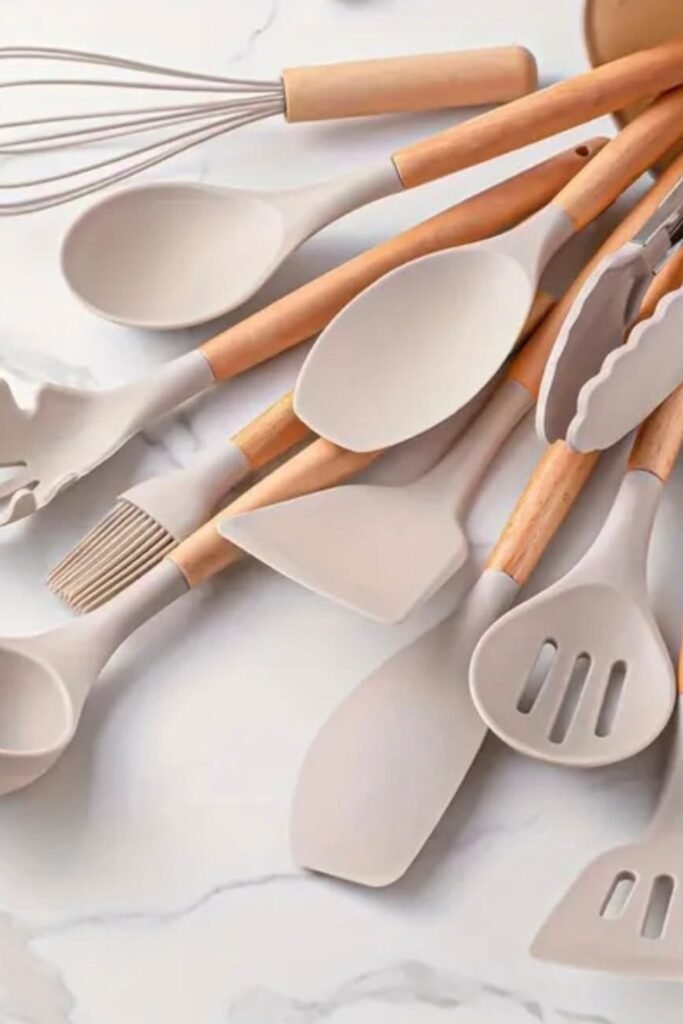
When you’re working in a small kitchen, you might want to choose multi-use tools, you can use a slotted spoon that helps you both drain and serve.
And if you meal-prep or focus on eating healthy, you’ll find that a salad spinner and airtight containers quickly become your best friends.
You don’t need to own everything, you just need to build a setup that fits how you actually cook every day.
4. Pick Safe, Long-Lasting Materials
You should know that the material of your utensils matters just as much as the tool itself.
You can choose stainless steel because you’ll see how durable it is, how easy it is to clean, and how well it works for everyday use.
You might use wooden utensils because they’re gentle on your cookware, but you should remember to oil them so you don’t let them crack.
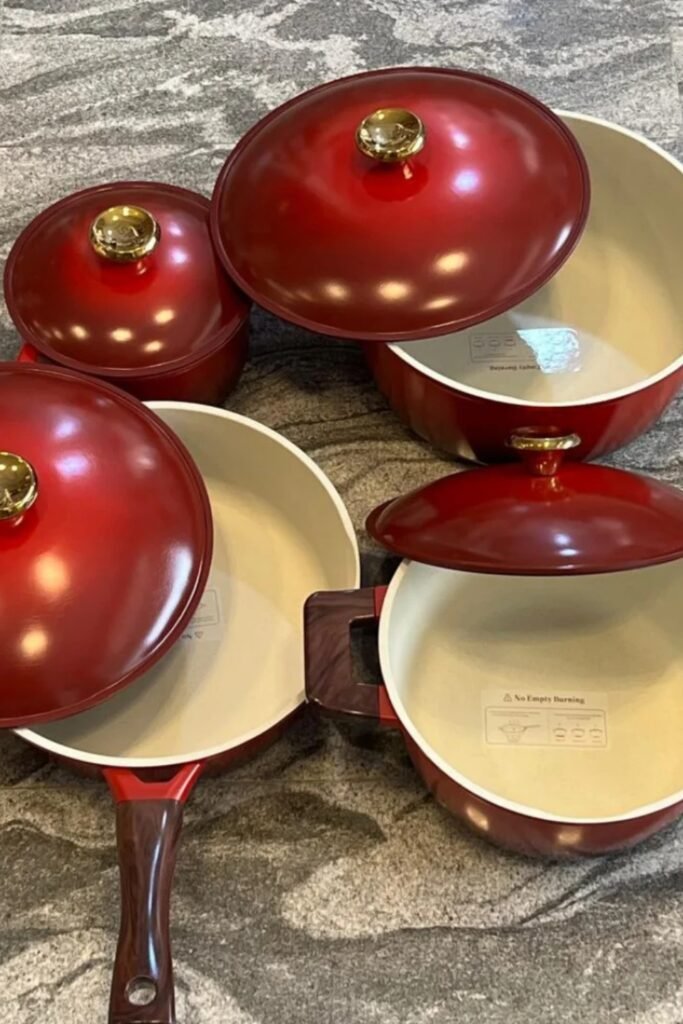
You can pick silicone tools because you’ll notice how well they handle heat and protect your nonstick pans but you must always check for “food-grade” labels.
You should avoid cheap plastics, because you don’t want them to melt or leach chemicals into your food.
When you invest in a few quality pieces made from safe, lasting materials, you’ll find you don’t need drawers full of flimsy gadgets, you’ll have exactly what you need to cook with confidence.
What Are the Must-Haves for Kitchen Cookware?
You’ll find that every kitchen works best when you have a few reliable cookware pieces that cover almost every meal.
You can start with a nonstick frying pan because you’ll see how easily you can cook eggs and quick sautes.
You should keep a medium saucepan so you can make soups and sauces without hassle, and you can add a large stockpot so you’re ready for pasta, stews, or big batches of broth.
You might also want a baking sheet and a casserole dish so you can handle oven recipes whenever you want.
If you cook often, you should get a cast-iron skillet because you’ll discover how it lasts for decades and how it adds incredible flavor to your dishes.
When you stick to these basics, you give yourself the power to cook almost anything without crowding your kitchen.
How Do You Take Care of Kitchen Utensils?
Keeping your utensils in good shape makes a huge difference for how long they last and how safe they are for you to use.
You should wash them right after cooking so you don’t let stains or bacteria build up.
When you use wooden tools, you should dry them right away and rub them with mineral oil each month so you don’t end up with cracks.
You must keep your knives sharp, and you should store them carefully so you don’t let them dull or chip.
You should avoid soaking metal utensils so you don’t cause rust, and you should check your silicone tools often for signs of melting or peeling.
When you replace anything that feels loose, cracked, or warped, you give yourself a kitchen that’s clean, dependable, and ready for every meal you want to make.
Conclusion
You don’t need a drawer full of fancy gadgets to cook well, you just need a few dependable tools that help you cook easier and enjoy the process more.
You should start with the essentials, and you can add new utensils as you build your skills.
You must focus on quality over quantity, because you’ll see how the right tools don’t just save you time, they make every meal smoother, safer, and more enjoyable to create.
When you choose your kitchen setup carefully, you give yourself the chance to turn cooking from a daily chore into something you actually look forward to.
You’ll discover that good food really does start with the right utensils.
FAQs
How many utensils do I really need to start cooking?
You only need about 10 to 12 basic utensils to get started, you can begin with a chef’s knife, a cutting board, a spatula, tongs, a ladle, a whisk, measuring cups, mixing bowls, and a few pots and pans.
You’ll find that these cover nearly every meal you want to cook.
You can always add more tools later when you figure out what you actually use most and what makes cooking easier for you.
How often should I replace my kitchen utensils?
You’ll find that most utensils last for years if you take good care of them.
You should replace them when you notice handles loosening, surfaces cracking, or tools losing their shape.
You’ll see that wooden spoons, cutting boards, and silicone spatulas usually need replacing every 1–2 years, depending on how often you use them and how well you care for them.
You may love to read!
